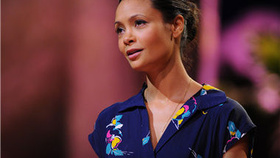Embracing otherness. When I first heard this theme, I thought, well, embracing otherness is embracing myself.
拥抱他人。当我第一次听到这个主题时,我觉得拥抱他人就是拥抱我自己。
And the journey to that place of understanding and acceptance has been an interesting one for me,
对于我来说,通往理解和接纳的路是十分有意思的,
and it's given me an insight into the whole notion of self, which I think is worth sharing with you today.
并且让我对“自我”这一概念有了深刻的理解,我想这值得在今天和你们分享。
We each have a self, but I don't think that we're born with one.
我们都有一个自我,但我并不认为这是与生俱来的。
You know how newborn babies believe they're part of everything; they're not separate?
你看那些刚出生的小婴儿,他们认为自己属于任何事物,他们并不是脱离的。
Well that fundamental sense of oneness is lost on us very quickly.
这种最基本的同一性,会很快从我们身上消失。
It's like that initial stage is over -- oneness: infancy, unformed, primitive. It's no longer valid or real.
如同最初始的状态已经结束,同一性:婴儿期未成形的,原始的,将不复存在。

What is real is separateness, and at some point in early babyhood, the idea of self starts to form.
取而代之的是分离,在婴儿期的某一点,关于自我的意识开始萌芽。
Our little portion of oneness is given a name, is told all kinds of things about itself,
我们同一性的一小部分被赋予了一个名字,被告知关于它自己的任何事情,
and these details, opinions and ideas become facts, which go towards building ourselves, our identity.
这些细节、观点和想法,变成事实,这些都帮我们形成自我以及自己的身份。
And that self becomes the vehicle for navigating our social world.
然后这个自我就成为一个工具,用来探索周围的这个世界。
But the self is a projection based on other people's projections.
但是这个自我实际上是一个投影,以其他人的投影为基础。
Is it who we really are? Or who we really want to be, or should be?
这就是真正的我们吗?是我们真正想成为,或者应该成为的人吗?



